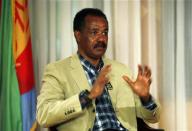From: Berhane Habtemariam (Berhane.Habtemariam@gmx.de)
Date: Wed Oct 21 2009 - 11:24:52 EDT
Eritrea blames Somalia's neighbours for violence
Wed Oct 21, 2009 1:55pm GMT
By Jeremy Clarke
<javascript:launchArticleSlideshow();> PhotoASMARA (Reuters) - Eritrean
President Isaias Afwerki said on Wednesday that years of interference by
neighbouring countries had fuelled the violence in Somalia.
He blamed Ethiopia, Kenya and Djibouti for having fanned the conflict in the
chaotic Horn of Africa nation.
"These neighbouring countries are part of the problem, they are not a part
of the solution," Isaias told Reuters in an interview.
The former Marxist guerrilla rejected suggestions that a solution to the
violence -- which has killed 18,000 since the start of 2007 -- could be
imposed on the divided nation.
"For the parties who are a part of the problem to come with the solution is
unthinkable. The experience of the last 20 years is proof to that," Isaias
said.
"It is not an option to impose a government from outside in Mogadishu and
declare that government to be a government of all Somalia. You cannot impose
a peacekeeping force in one city and say there is a government."
Isaias said the involvement of the United States was complicating the peace
process because it had become preoccupied with hunting terrorist suspects.
"The United States (and others) getting involved in Somalia because of what
they call terrorism is a problem. In Somalia it is distorting the facts on
the ground and probably fuelling undesired external intervention from
neighbouring countries."
SANCTIONS?
Washington and the United Nations accuse Eritrea of sending arms and other
support to Somali insurgents battling the country's U.N.-backed government
-- something Asmara denies.
A U.N. arms monitoring body -- set up to watch violations of a 1992 arms
embargo -- said Asmara was sending plane- and boat-loads of munitions to
Somali rebels, as well as providing them with logistical support.
The U.N. body said Asmara was providing between $200,000 and $500,000 a
month to support the rebels.
The move towards imposing sanctions on Eritrea has gathered speed in recent
weeks with Britain joining the chorus of nations willing to punish the Red
Sea state.
The U.N. Security Council, the African Union and the United States have all
warned Eritrea against destabilising Somalia.
Isaias denied the accusations and said sanctions should not be imposed
without evidence.
"All these accusations have nothing to do with the reality on the ground. If
you have evidence, come up and show me."
C Thomson Reuters 2009 All rights reserved
Eritrean president says West against him
Wed Oct 21, 2009 2:46pm GMT
By Jeremy Clarke
ASMARA (Reuters) - Eritrean President Isaias Afwerki said on Wednesday that
Western intelligence agencies and special interest groups were persecuting
Eritrea by inventing lies, rumours and defamatory reports.
The Red Sea state, which has faced criticism in recent weeks from
international diplomatic and humanitarian organisations, denied any
wrongdoing.
"It's been the cause of the all problems we see all over the world ... it's
a network of (Western) intelligence agencies that serve special interest
groups globally," the long-serving Eritrean leader told Reuters in an
interview.
"It is sometimes very perplexing for me. Why all these lies? Why do you have
to go and cook such statistics and make statements about the reality in
Eritrea when you don't even know what's going on in this country?"
Isaias, a former rebel commander in power since 1991, said he was unmoved by
the criticism.
ERITREA MALNOURISHED?
The Food and Agriculture Organisation said in a report last week that
Eritrea was dangerously underfed. The U.N. agency said as many as two in
every three Eritreans were malnourished, something Isaias denied.
"It's not true, it's all lies. It's a fabrication," he said, adding that
humanitarian organisations were motivated by the business opportunities
crises and aid offer in other African countries.
"It's money-making for them. It's not solving problems. It's a collaboration
of domestically corrupt special interest groups with international mafia
that have a big interest in publicising hunger and other crises," the
63-year-old leader said.
A recent International Monetary Fund (IMF) mission to Eritrea said the
economy had weakened significantly in the last 12 months due to a severe
drought in 2008 and the global crisis but Isaias had no time for such
assessments.
"They (the IMF) make judgments on very limited knowledge and the government
of Eritrea has been very sceptical all along of comments, judgments,
suggestions that come from the IMF. I personally don't take them seriously."
WHERE'S THE PROOF?
A separate report this week by international advocacy group Reporters
Without Borders named Eritrea, in an assessment of its press freedoms, as
the worst country in the world for a third year running.
It said that no independent media is tolerated in Eritrea and that 30
journalists were in prison -- as many as in China or Iran but with a much
smaller population.
But Asmara bristled at repeated accusations by rights groups that it puts
independent journalists and non-Orthodox Christians in jail, tortures
detainees, and keeps people indefinitely in military service.
The president insisted all such accusations, and his alleged role in
destabilising the region, were malicious fabrications designed to blacken
Eritrea's name.
"Why these accusations about Eritrea's role in this region when there is no
fact to prove what is being claimed?"
The former Marxist guerrilla leader has ruled one of Africa's smallest
economies since its 1993 formal independence from Ethiopia. For supporters,
he is a symbol of resistance and self-reliance, but critics say he is an
authoritarian whose government brooks no dissent.
C Thomson Reuters 2009 All rights reserved

----[This List to be used for Eritrea Related News Only]----